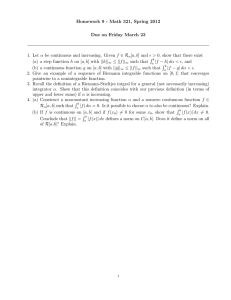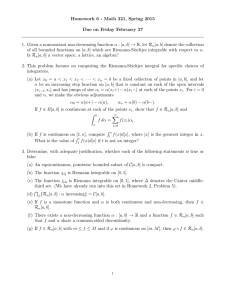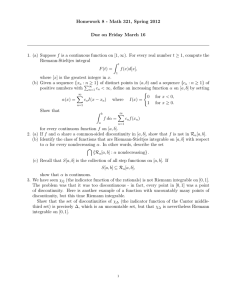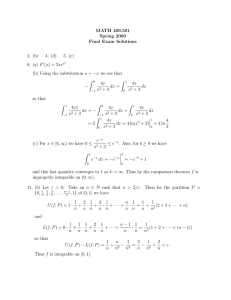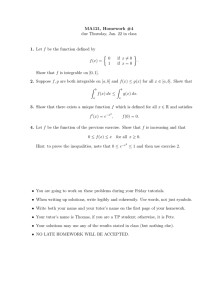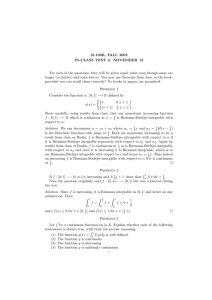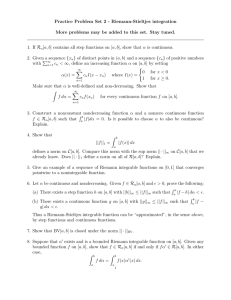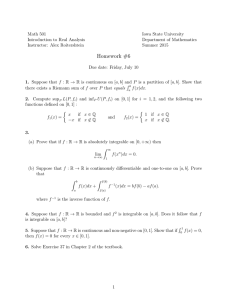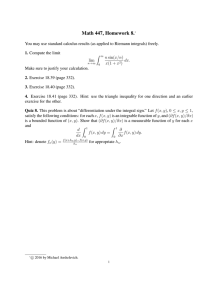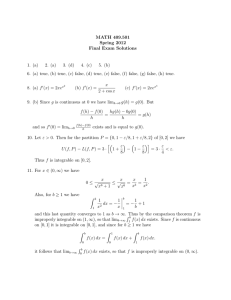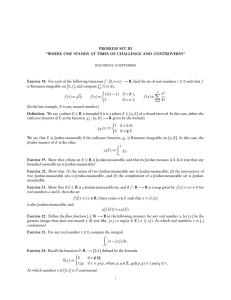Homework 8 Math 501 Due October 31, 2014 Exercise 1
advertisement
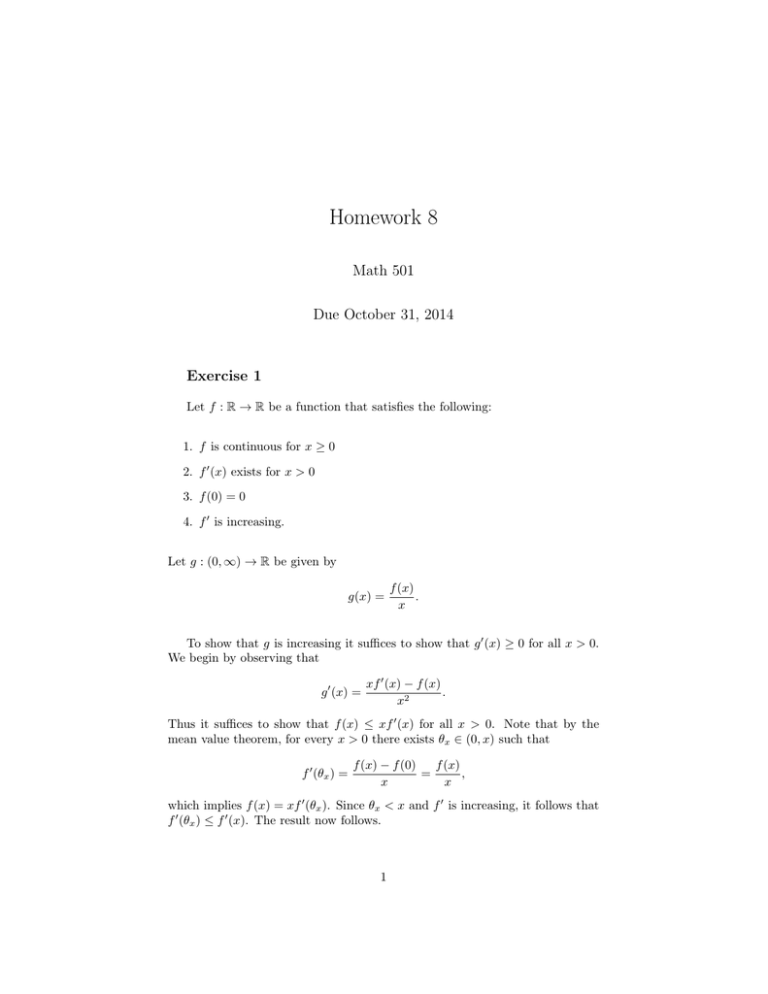
Homework 8
Math 501
Due October 31, 2014
Exercise 1
Let f : R → R be a function that satisfies the following:
1. f is continuous for x ≥ 0
2. f 0 (x) exists for x > 0
3. f (0) = 0
4. f 0 is increasing.
Let g : (0, ∞) → R be given by
g(x) =
f (x)
.
x
To show that g is increasing it suffices to show that g 0 (x) ≥ 0 for all x > 0.
We begin by observing that
g 0 (x) =
xf 0 (x) − f (x)
.
x2
Thus it suffices to show that f (x) ≤ xf 0 (x) for all x > 0. Note that by the
mean value theorem, for every x > 0 there exists θx ∈ (0, x) such that
f 0 (θx ) =
f (x) − f (0)
f (x)
=
,
x
x
which implies f (x) = xf 0 (θx ). Since θx < x and f 0 is increasing, it follows that
f 0 (θx ) ≤ f 0 (x). The result now follows.
1
Exercise 2
Let f : [a, b] → R be a bounded function that is continuous at a point
t ∈ (a, b). Let c ∈ R and let α : [a, b] → R be given by
c x≥t
α(x) =
.
0 x<t
Let > 0. By the continuity of f at t, there exists δ > 0 such that |f (x) −
f (t)| < /(2c) whenever x ∈ [a, b] satisfies |x − t| < δ.
Let P = {x0 , . . . , xn } be a partition of [a, b] such that ∆xi < δ for all
i = 1, . . . , n. Note that ∆αi = c for the unique 1 ≤ i ≤ n such that xi−1 ≤ t ≤ xi
and ∆αj = 0 for all j 6= i. Therefore,
L(P, f, α) = cmi ,
U (P, f, α) = cMi .
where
mi = inf{f (x) : x ∈ [xi−1 , xi ]},
Mi = sup{f (x) : x ∈ [xi−1 , xi ]}.
Note that |f (u)−f (v)| ≤ |f (u)−f (t)|+|f (t)−f (v)| < /c for all u, v ∈ [xi−1 , xi ]
by continuity. Since u, v were arbitrary, it follows that Mi − mi < /c. Thus
U (P, f, α) − L(P, f, α) = c(Mi − mi ) < .
It follows that f is Riemann-Stieltjes integrable with respect to α.
Note that
Z
L(P, f, α) ≤ cf (t) ≤ U (P, f, α),
L(P, f, α) ≤
f dα ≤ U (P, f, α),
a
from which it follows that
Z b
f dα < .
cf (t) −
a
Since was arbitrary
Z
b
f dα = cf (t).
a
2
b
Exercise 3
Let f : [a, b] → R be Riemann integrable and continuous at t ∈ (a, b). Let
c1 , c2 ∈ R and let α, β : [a, b] → R be given by
c1 x x ∈ [a, t)
c1 x
x ∈ [a, t)
α(x) =
, β(x) =
.
c2 x x ∈ [t, b]
c2 (x − t) + c1 t x ∈ [t, b]
Let I1 =
Rt
a
f dx and I2 =
Rb
t
f dx.
Let > 0 and let
η=
.
3(c2 − c1 )t
By the continuity of f at t, there exists δ > 0 such that
|f (x) − f (t)| < η
whenever x ∈ [a, b] satisfies |x − t| < δ. By the Riemann integrability of f there
exists a partition P = {x0 , . . . , xn } of [a, b] such that
,
U (P, f ) − L(P, f ) < min
3c1 3c2
Without loss of generality, we may assume ∆xi < δ for all i = 1, . . . , n. Indeed,
if the above P does not satisfy this condition, we may refine P and it is clear
that the refinement will still satisfy the above inequality. Moreover, arguing in
the same fashion, we may assume that t ∈ P . Suppose xi = t
Let P 0 = {x0 , . . . , xi } and P 00 = {xi , . . . , xn }. Note that
U (P 0 , f ) − L(P 0 , f ) ≤ U (P, f ) − L(P, f ) <
,
3c1
U (P 00 , f ) − L(P 00 , f ) ≤ U (P, f ) − L(P, f ) <
3c2
and
Note then that
∆αi = c2 xi − c1 xi−1
= c1 ∆xi + (c2 − c1 )t
and
∆βi = c1 ∆xi
Moreover,
∆αj = ∆βj =
3
c1 ∆xj
c2 ∆xj
j<i
j > i.
Observe that
U (P, f, α) =
n
X
Mi ∆αi = c1 U (P 0 , f ) + c2 U (P 00 , f ) + Mi (c2 − c1 )t
i=1
and
L(P, f, α) =
n
X
mi ∆αi = c1 L(P 0 , f ) + c2 L(P 00 , f ) + mi (c2 − c1 )t.
i=1
It follows that
U (P, f, α) − L(P, f, α) < 2/3 + (Mi − mi )(c2 − c1 )t
< 2/3 + η(c2 − c1 )t
<
Thus f is Riemann-Stieltjes integrable with respect to α. Moreover, note that
Z t
c1 L(P 0 , f ) ≤ c1
f dx ≤ c1 U (P 0 , f )
a
and similarly,
c2 L(P 00 , f ) ≤ c2
b
Z
f dx ≤ c2 U (P 00 , f ),
t
from which it follows that
L(P, f, α) ≤ c1 I1 + c2 I2 + (c2 − c1 )tf (t) ≤ U (P, f, α)
Therefore, since
Z
L(P, f, α) ≤
b
f dα ≤ U (P, f, α)
a
it follows that
Z b
f dα < .
c1 I1 + c2 I2 + (c2 − c1 )tf (t) −
a
Therefore
Z
b
f dα = c1 I1 + c2 I2 + (c2 − c1 )tf (t).
a
Furthermore,
U (P, f, β) =
n
X
Mi ∆βi = c1 U (P 0 , f ) + c2 U (P 00 , f )
i=1
and
L(P, f, β) =
n
X
mi ∆βi = c1 L(P 0 , f ) + c2 L(P 00 , f )
i=1
4
Therefore,
U (P, f, β) − L(P, f, β) < 2/3 < We conclude that f is Riemann-Stieltjes integrable with respect to β. A similar
argument to that above shows that
Z
b
f dβ = c1 I1 + c2 I2 .
a
5
